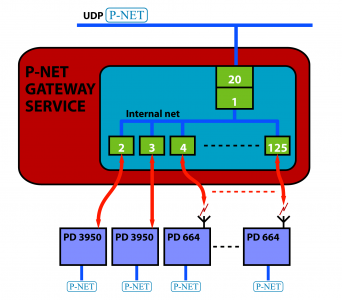P-NET Gateway Service
Purpose of the P-NET Gateway Service
The purpose of the service is to act as a gateway, so that incoming P-NET packages on either UDP or USB can be routed to the desired destination. A typical application will have one, or a few, PD 3950 USB devices, which are used to connect a PC to local P-NET installations.

Internal structure of the P-NET Gateway Service
The P-NET Gateway Service is a software service that runs on a Windows based PC. The service consists of a number of nodes, as described in the following notes. The numbers in brackets refer to the system overview above:
· UDP node (20). This node has a port for connection to the UDP net, and a port for connection to an Internal node.
· Internal node (1). This node is connected to the UDP node on one port and to an Internal net on the other port. There may be more than one Internal node if the total number of GPRS and USB devices connected to the service exceeds 124. This situation is described in a separate document.
· USB nodes (2…125). Each USB node is connected to the internal net, and furthermore each has a port for connection to a local PD 3950 USB device.
The structure of the P-NET Gateway Service (required number of nodes and nets) can be edited using the normal editing facilities in VIGO.
If needed, the P-NET Gateway service can be configured to have up to 15376 ports. This is described in a separate document, P-NET Gateway Service, large installations. LINK MANGLER!
Channel structure
Like other P-NET nodes, the nodes of the P-NET Gateway Service have channels, as described below:
UDP node
| Channel no. | Channel name | Channel description |
|---|---|---|
| 0 | Service | Service channel |
| 1 | UDP | UDP channel |
| 2 | Configuration | Configuration channel |
| 3 | Systeminfo | Systeminfo channel |
Internal node
| Channel no. | Channel name | Channel description |
|---|---|---|
| 0 | Service | Service channel |
